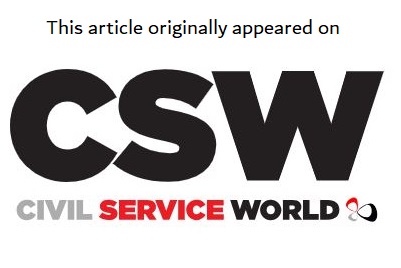As government is reshaped by a wider ‘digital revolution’, the departing chief operating officer Alex Chisholm believes technology could help offset the twin pressures of declining headcounts and rising demand
The soon-to-depart civil service chief operating officer Sir Alex Chisholm has claimed that, despite a shrinking workforce and growing demand from citizens, “innovation will win out” and enable government to improve productivity and service levels.
In a recent public appearance at an event held by the Institute for Government, Chisholm was asked about the civil service’s full-time equivalent headcount reaching 500,000 mark. This follows the chancellor’s announcement in October of a workforce cap, alongside plans to bring the headcount back down to pre-Covid levels.
Chisholm, who also serves as permanent secretary of the Cabinet Office, said that the “cost and sustainability” of the workforce is the “most important thing”, adding that “we shouldn’t only look at civil servants; we should look at public servants”.
“Around about half a million civil servants, around about five million public servants, those are actually quite fungible,” he told attendees of the event. “There are jobs that can be done by civil servants in the Ministry of Defence and by the armed forces that are more expensive to be done by armed forces, but you can move those numbers around. That’s true for all other departments as well. Plus, cost gets you thinking about: do you want this to be done civil servants at all or would you prefer it to be done by consultants or contractors or other partners that you might have in civil society? So I think cost is your best guide to what you’re trying to achieve.”
Related content
- AI could save £5bn a year and take workload from ‘tens of thousands’ of jobs, government ops chief says
- ‘Better, smaller and fairer’ – Cabinet Office taps £50k consultancy to ‘turbocharge’ transformation
- Growth in ‘deep skills in digital and data’ has enabled £400m reduction in consultancy spend, government ops chief claims
Chisholm said he expects civil service numbers to fall because, “like any other organisation, we’re living through a kind of digital revolution and everybody should be able to use technology and data to… do the tasks they formerly had much more easily at lower cost and with higher levels of reliability”.
However, he acknowledged that, at the same time, demand and expectations for public services is growing – “so it’s a race between those two things”.
“Because I am relentlessly optimistic, I think that the productivity and innovation will win out against the increasing demand and expectations, and with that it will mean that everybody’s job is going to become more valuable because the output of their work will be greater,” he added.
Chisholm also said this should result in better pay packages.
“I think with the right investments in digital infrastructure and training, and everything else that goes with that, it will enable the overall service quality to rise without the costs rising, and that will also improve the capability to pay people a more competitive wage. That’s my optimistic view of how that will play out,” he said.





